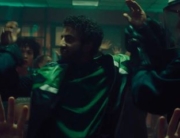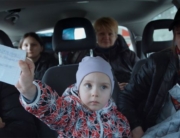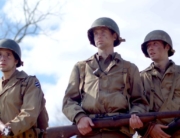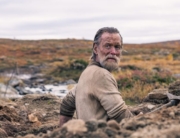Sobibor grimly strives to make up for the fact that for almost 60 years, Soviet and Russian leaders stressed how the approximately 25 million who died in the Great Patriotic War made the Holocaust pale in comparison, while downplaying Jews were specifically targeted by the Nazis. This feature film is the first Russian acknowledgement that Red Army soldiers were separated from a POW camp in Minsk because they were Jewish, transported to eastern Poland in September 1943, and, within weeks of their arrival, led the only successful mass escape from a Nazi extermination camp.
Debut director and star Konstantin Khabensky, known as an actor in such films as Night Watch (2004) and Day Watch (2006), introduces audiences explicitly to the function of the camp in the “First Day” opening scene with the international cast. Families of all ages with yellow Jewish stars are let off a full train while a loudspeaker repeatedly blares, “Welcome to your new lives!” They barely notice the ghostly figures mechanically collecting their luggage and translating into Yiddish and other languages instructions of Nazi commander Karl Frenzel (Christopher Lambert, in what is probably his first German-language role in his 40-year career).
While they are lining up by the tracks, bespectacled prisoner Chaim Engel (Polish actor Fabian Kociecki) sidles up to pretty Selma Wijnberg (Russian actress Mariya Kozhevnikova) and whispers for her to raise her hand when the officer asks for people with special skills: “Take any work to stay alive.” Shocked, she hesitantly moves forward when the call is for seamstresses.
Families are separated, with children arguing about which parent or sibling to accompany. Well-dressed Jewish women joke about how boring the labor camp seems and their need for a shower after two days in the train. They are quickly pushed inside to strip and then into the “showers.” An officer sets off the gas and lingers to look at the nude women, to the guffaws from other guards. The women choke to death and their bodies pile up.
It is clear this is not primarily a labor camp, and this is not a film of subtlety, with characters and situations writ large to match the horrors. Lithuanian cinematographer Ramunas Greicius offers almost daily sunrise and sunset views of the meticulously re-created buildings, and especially the barbed wire fences, set off at night by constantly moving searchlights.
In the men’s barracks, the Russians are already talking escape while the other Jews are praying and eying them suspiciously as provocateurs, until Alexander “Sasha” Pechersky (Khabensky) pulls down his pants to prove to them he’s a Jew, too. Russians are quickly outside reconnoitering and asking lots of questions of the other prisoners the next day in the carpentry workshop.
Pechersky starts flirting with Luca (Swedish actress Felice Jankell), who warns him against going out again at night. But several do try to flee that night, setting off mines, alarms, and machine gun fire. All the prisoners kneel outside, and the commander announces the collective punishment for the actions of the few; in an extended scene, all have to count to 10, and every 10th person is shot in the head. The Russians begin to fathom that the Jews are not inherently weak but have been beaten down by months of starvation, brutal whippings, and arbitrary deaths. When the men are marched out to the woods to cut trees into lumber, Pechersky decides what they need is military-style organization. Another prisoner counters: “We need a Moses.”
Pechersky insists that the escape has to include all the Jews. I’ve read that the Russian dialogue refers to the rest of the Jews as the equivalent of “kikes”; the tough soldiers seem to have no recognition the others are civilians when they mock their lack of killing experience. However, hate and revenge are powerful motivators for mano a mano assassinations. Women risk punishment to smuggle supplies, and young teen boys are key to keeping the guards unsuspecting, as even more memorably remembered by such a survivor in Claude Lanzmann’s Shoah addendum Sobibor, October 14, 1943, 4 p.m. (2001).
Though this version notes the Jewish kapos complicity for supervision as a survival strategy, left out are the Ukrainian guards whom survivors cited for cruelty. The reign of terror surpasses the drunken sadism seen in the somewhat satirical The Captain last year. Every guard is more depraved than even Amon Goth in Schindler’s List. Names of the actual SS officers are used, and most are played by German actors.
The lengthy concluding scroll blames local Poles for killing or turning in many of the hundreds of escapees, such that fewer than 50 made it to freedom. Not mentioned are Pechersky’s postwar arrests for treason for first being a POW and then a Jew, and that the Soviet Union did not permit him to serve as a witness in any of the international war crimes trials. Instead, Pechersky and other survivors are heroically described as trying to hunt down the Nazi perpetrators themselves.
President Vladimir Putin posthumously awarded the Order of Bravery to Pechersky as the leader of the unique rebellion, and the government provided substantial funds for this film, which was Russia’s entry last year for the Best Foreign Language Film Academy Award. Putin has also used the film to upgrade his relationship with Israel, which had criticized the absence of Holocaust education in Russia, and it was the centerpiece of a recent summit with Prime Minister Benjamin Netanyahu in Moscow. Pechersky is the focus of a foundation, which co-produced the film and sponsored statues, exhibitions, books, and other commemorative recognition for the 75th anniversary of the uprising last October.
Along with the Russian government’s recent restoration of Sergei Bondarchuk’s epic War and Peace and this film, Putin’s approved cinematic touchstones to when Russia was great are formidable.







Leave A Comment